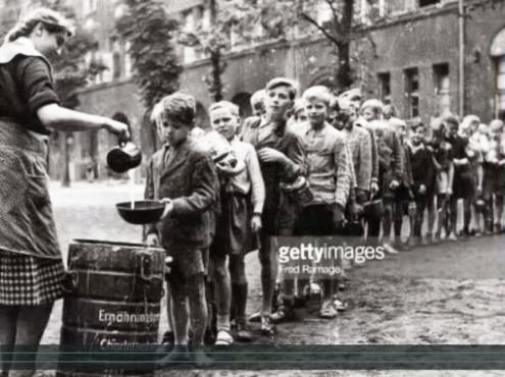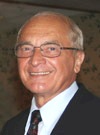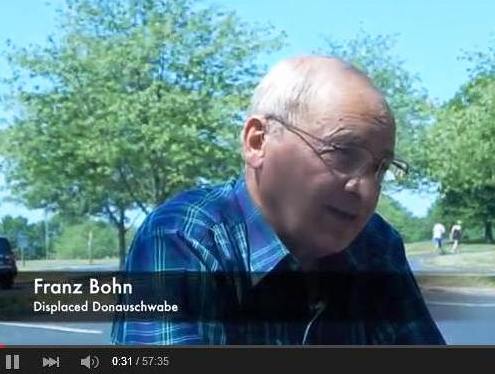|

On Sophia's
Interview
by
Franz Bohn, 16 June 2015
Displaced Persons Camp
Coordinator |
 |
It was so gratifying to see a young
person choose a Donauschwaben theme for her school
project. Most history being taught in this country today
gloss over any post war German-related hardships. I
tried to explain to Sophia that life is extremely
fragile, and even seemingly stable life circumstances,
like the Donauschwaben lives in Yugoslavia during the
pre-war years, can drastically change in an instant.
It's quite a revelation to our young people (like
Sophia) that without warning, you can be evicted from
your home, or worse...killed, with no one to turn to for
help. All of a sudden, the authorities cannot be
trusted, laws mean nothing and ethnic cleansing becomes
a reality. The term refugee is often used in today's
news, but very few people know what that really means.
Fleeing from your home in a panic, with almost no
belongings, living in crowded boxcars for weeks, never
knowing from one day to the next what will happen, not
knowing who can be trusted, severe starvation, illness,
discrimination and miserable post-war DP camp conditions
are the things that I see when refugees are mentioned.
I was impressed with Sophia's maturity, and above all,
her genuine interest in the plight of the Donauschwaben,
both in post-war Europe and later on, in America. She
showed a great level of interest in the assimilation of
the Donauschwaben people into American society. I
emphasized to her that we were blessed with the
Donauschwaben values, immense work ethic and an inherent
quality of plain old human decency. These traits helped
me and my family make it through all the ordeals, and
interestingly, they also helped me achieve educational
and career successes in this country.
Bottom Line: Those of us with the Donauschwaben DNA are
truly blessed.
Best regards
Franz

 |
 |
| |
Sophia Swartz,
2015 |
***
Sophia's initial May 17, 2015 email
request:
Hi, my name is Sophia Swartz, and I
am a ninth grader who is currently working on a project
called Oral History Assessment where students interview
an individual regarding their knowledge or experiences
on a topic in order to bring history alive through a
documentary. This year, I have chosen to base my project
off of the immigration and integration of der
Donauschwaben into America, and how self-identification
through community, perseverance in the face of
persecution, pursuit of the American Dream, and
remembrance forged a long-lasting legacy that continues
to be enriched by the archival work that you do. This
topic has a true personal connection to me because
my maternal great-grandmother acted as a host family
for displaced Banat Germans in the 1940s in Austria.
Since my family has remained in contact with the
then-refugees, I had originally planned to interview my
grandfather. However, since my history teacher demanded
that my project have more of a focus on American
history, I'm reaching out to you to see if we could
discuss der Donauschwaben's immigration and integration
into America. Thus, I would greatly appreciate it if you
had the time to spare to answer some questions I have
regarding the experiences of der Donauschwaben before,
during, and after immigrating to America.
It is imperative that the interview
be conducted either face-to-face (the most preferable
option) or by Skype and demands a finished product June
1st. I live in the Doylestown area in PA. I would be
very thankful if you could refer me to someone.
Thank you so much for your time and help, I really
appreciate it!
Have a great day! All of the Best,
Sophia Swartz
***
The message was forwarded to me
to assist Sophia. I knew the best person for this
interview would be Franz Bohn. He not only has hand
knowledge of the subject matter but lives only 10 miles
from Doylestown. He graciously agreed to meet with
Sophia and the finished interview/video proved he was
the perfect candidate. Thank you Sophia for selecting
the Donauschwaben for your project and having the
tenacity to produce a special treat for Danube Swabian
researchers worldwide.
~ Jody McKim Pharr, DVHH Founder
& Webmaster
|
|

 |
 |
| |
Sophia Swartz,
2015 |
Franz Bohn
Donauschwaben Documentary Transcript
Opening Quote:
“General Eisenhower informs me that the forces of
Germany have surrendered to the United Nations…the flags
of freedom fly all over Europe.”
—Harry S. Truman,
former U.S. President
Text:
Following
WWII, 4 million Yugoslavians were forcefully removed
from their homeland, as a result of genocide, ethnic
cleansing, and strategic bombing.
Somber music plays
as bombs drop
Franz Bohn:
Especially
in 1945, 1946, and 1947, which was right after the war,
and there just wasn’t anything left. No food, no
blankets, no clothes, no schools, it was very tough.
Having been a refugee in Austria was a good training
ground for being a refugee in the United States.
Text:
By 1947, 850,000 Europeans lived in in Displaced Persons
Camps as a result of ethnic cleansing. This is their
story of immigration and survival.
Title:
The 1950s Donauschwaben Immigration: Community &
Self-Identification, Perseverance through Hardship, and
Pursuing the American Dream & Remembrance.
Clip:
We in America are immigrants, or the children of
immigrants. We are one people, but a people welded from
many nations and races.
Primary Source
Letter Reading:
Dear mother, the benefits of being an American are
limitless, some of which are financial aid for
education, medical coverage, and loans. I would say, if
you could put your mind to it, you have everything that
a human being could possibly need to excel in any field.
It is a thriving culture, one that only continues to
grow with every passing day. Sincerely, Sarah Jaraczyk,
Friday, March 8th, 1952.
Historical Context
Narration:
During the 1950s,
many industries expanded to create more middle-class
jobs. In 1955, Pennsylvania’s Bethlehem Steel employed
27,000 workers and produced 3.5 million tons of steel,
creating a large market for suburban developments like
Levittown and thus fueling automania. Soon, roads were
filled with ’57 Chevies and Corvettes, and Americans’
brains were preoccupied not only by television and
transistor radios, but also by Cold War fears revolving
around the detonation of the nuclear bomb. Consumed by
consumerism as much as they were obsessed with the next
episode of Leave It to Beaver, Baby Boomers
defined what it meant to live during the so-called
“Happy Days.” However, the 1950s were also a time of
immigration for the thousands upon thousands of
Europeans displaced by the ethnic cleansing and
genocides of WWII. Hoping to find their own American
Dream, many Donauschwaben left the Displaced Persons
Camps scattered in Austria and Germany to arrive at
Ellis Island and start a new life.
Franz Bohn
(starts @ 3:52):
OK, I was eleven, and this was in 1952, we traveled by
train from Salzburg, in Austria, to Bremen, which is a
port in Germany, and then we took a US Transport Troop—a
troop transport ship—and it took twelve days and two
storms to get to New York and Ellis Island. Ellis Island
was just a very busy place where a lot of immigrants
traveled through. We were all poor as dirt, we didn’t
know the language, and then we were processed.
Processing at Ellis Island entailed answering questions
and delousing. Delousing was when they sprayed powder
into your clothes and into your…into everything just to
make sure you didn't bring any lice or other vermin with
you. It was a little bit dehumanizing, but we kind of
took it as part of the price you have to pay to come to
this great country.
All of the refugees
had this same thing, wow—you know—we’re finally here,
the opportunities are here, some of the ugly stuff from
the war is behind us, and we’re going to make the best
of it. Having gone through hell, having gone through
losing our home, a knock on the door in Yugoslavia where
people said, “Get out, or we’ll kill you,” and not being
able to take anything with us, seeing other people shot,
running to a railroad station, jumping on railroad
wagons just to get out so you don’t get killed—having
gone through all of that builds a certain moxie in you.
Having been scared to death when you survived does
something to you, and I think that builds strength in me
that I have drawn on many times. When I look at a
project, and say, “Boy, this is really tough,” and then
I say, you know, it’s nothing at all like what I went
through before, we can do this. That’s a source of
strength.
Song (“Mein
Banaterland”) plays; title of “Self-Identification
through Community: Its Role in Donauschwaben Integration
Following Immigration”
Franz Bohn
(starting @ 7:00):
The
community drives how you behave, what’s…what your
ambitions are, kind of how a community establishes a lot
of rules that you identify with. Ok, so your
self-identity is really based a lot by your family and
the community. You’d be amazed how much influence the
camp population of about 500 people had on me, had on
us. We had one person who was the unofficial policeman,
one person was the unofficial plumber, who took care of
the septic system, and so on. So when you’re in that
environment, you pick up on, hey, this is what I’m going
to have to fit into, OK, so you self-identify with that,
so those values are basic.
Song plays (“What
A Difference a Day Makes”); title of “Perseverance
through Hardship: Surmounting Obstacles with
Donauschwaben Principles”
Franz Bohn
(starts @ 8:18):
Well, of
course, the biggest challenge was for mom to get a job.
OK, she got a job—we arrived here on Thursday, she got a
social security card on Friday, she started working on
Monday. That’s the Donauschwaben heritage. There was no
sitting on our laurels and taking a breather because
it’s been a long trip. No, she wanted to go to work. She
worked in a U.S. military uniform company, Foster’s in
Philadelphia, and 8 hours a day, she was sewing
uniforms. I think the biggest challenge, and this might
sound a little crazy, was the homesickness. In those
days—it’s hard for your generation to understand—but in
1951, when you came to America, there was no going back,
it was a one-way trip, and there were no telephones. At
that time, my relatives in Austria had no access to
telephones—as a matter of fact, we didn't have a
telephone in our house until the mid-60s. So, I would
say that was the biggest challenge—the hurt of not being
with your relatives, the hurt of remembering what
Austria was like, and all of the good stuff that I as a
child thought was enjoyable—the soccer games; I hated
leaving because I was part of the soccer team, you know!
But how do you adjust it? Well, you have to get over
that; you gotta get over that homesickness and hurt.
It sounds mundane,
but the work ethic, the appreciation of being civil to
one another, the strength that you find in neighbors and
relatives, we all take that for granted here, but you
know, it’s so much different when everybody has to run
for their lives and you take care of each other. And
that, I think, is what influences not only me, but the
Donauschwaben to a great degree.
Music plays (“All
I Have to do is Dream”); title is “In Pursuit of the
American Dream: Isolating the Road to Happiness by
Escaping Ethnic Cleansing”
Franz Bohn
(starts @ 11:08):
The
American Dream is that you’re not stuck in a social
level; in other words, if you’re poor, you’re always
poor. In most countries, and I believe Austria and
Germany and Holland, that’s pretty much it. You don't
realize it, but in many of those countries, there is a
certain snobbishness among levels. OK, if you’re a
doctor, you want to be called “Herr Doctor,” not Hans,
or Herr Braun, you want to be called doctor, same with a
teacher. So you have this accepted strata of society,
and it’s very hard to go from one to the next, because
you're kind of looked down upon. This is all across
Europe—and you don’t have that here. You really
don’t—you’ve heard about the other side of the tracks?
That’s about as close as you’ve got. But we've seen so
many poor people in this country really do well and make
something of themselves.
It has had a greater
impact when I came to the United States—I’m the first
one in the entire family who’s ever gone to college and
got a Master’s Degree, much less a Bachelor’s. It’s the
environment that I’ve benefitted from. I’ve got
healthcare like my grandfather never had, like my mother
never had. That was really what it boils down to—they
are not lazy people, we are not lazy people, and we
despise people who are lazy. OK? So that’s a common
thread among many, and I think that’s what helps us
obtain the American Dream, no matter what shape it
has—the American Dream is a little different for
everybody. But if you take a look at it, what do you
really want out of life? You want to have a happy
family, you want to have a decent standard of living,
and you’re able to do that here.
Music plays (“Mein
Banaterland” – Brass Band Version); title is
“Remembrance: Forging a Donauschwaben Legacy that will
Span Generations”
Franz Bohn
(starts @ 13:22):
My
children don’t speak German, OK, because I married an
American woman, so it was difficult to insist on them
speaking German. They embrace my history, they embrace
our heritage and our experiences, but there’s no way
they can appreciate—really—no matter what I tell them,
no matter how often I tell them. I show them pictures, I
Google Earth and I walk around Groedig, you know? But to
them, it’s second- or third-degree away information. Now
there’s fundamental things that I have taught my kids,
which is hard work, and go to school, have values, know
how bad it can be—I tell them all the time how bad it
was and how great they have it, and I hope 10% of it
sinks in. OK? So, I’d love to say that there would be
Donauschwaben forever, but I also am a realist (last
sentence of audio was meant to be cut at this point à
sorry for the poor fade!).
Credits roll to
“Mein Banaterland” |